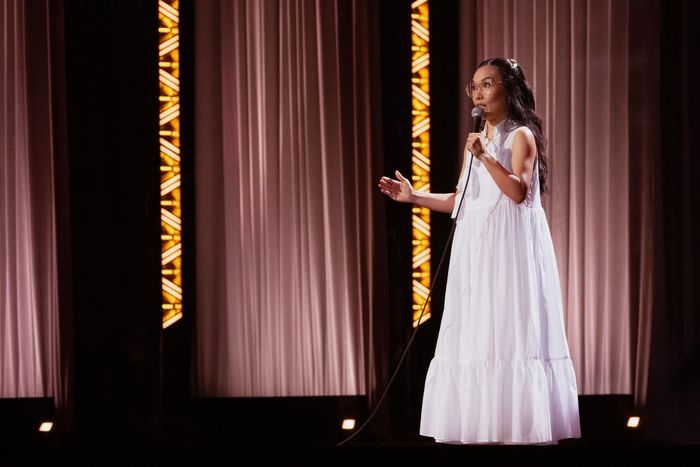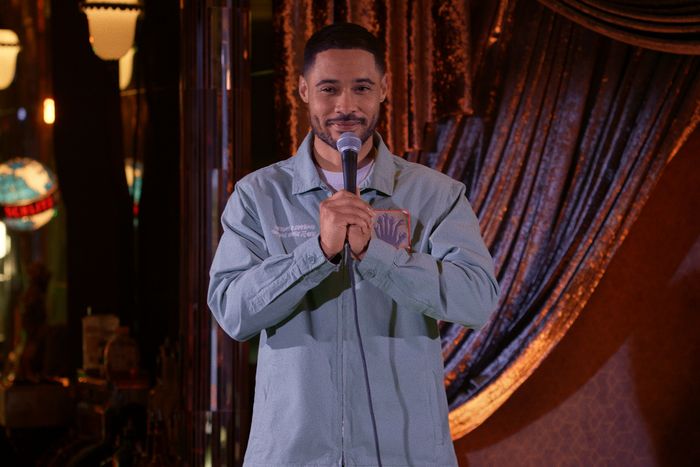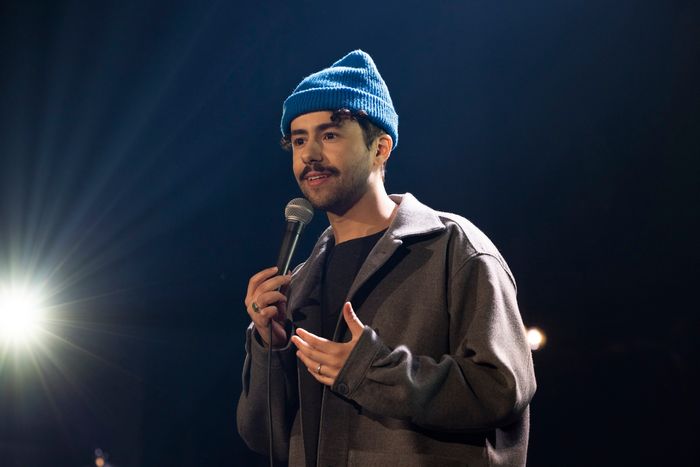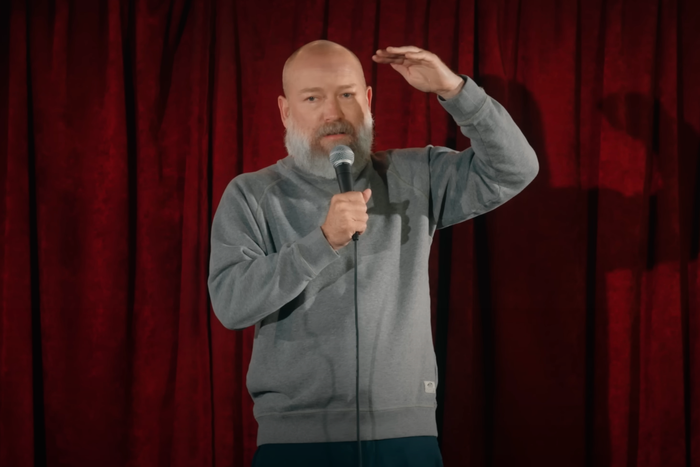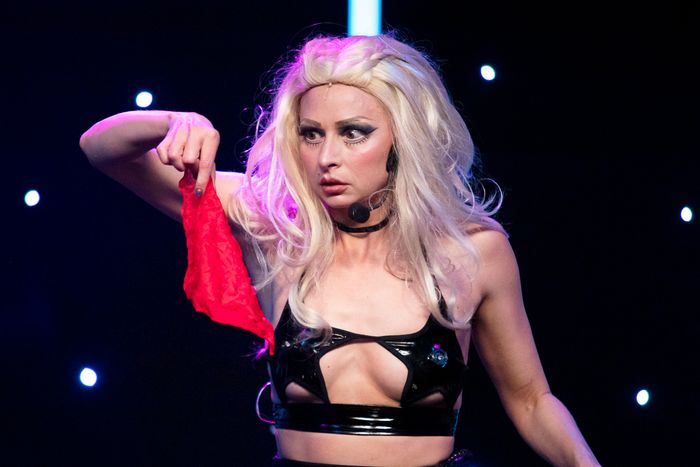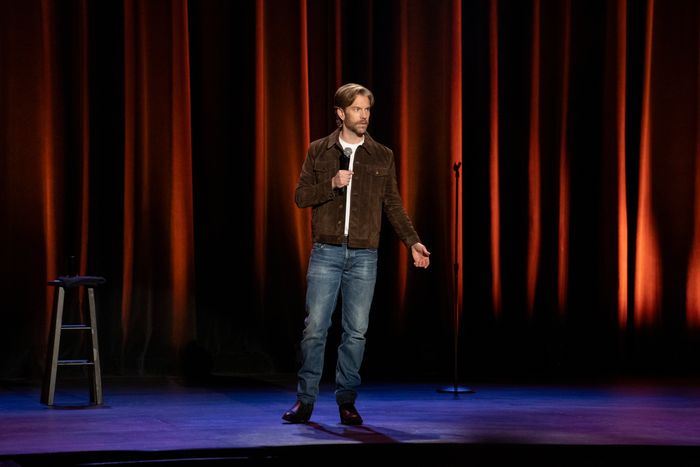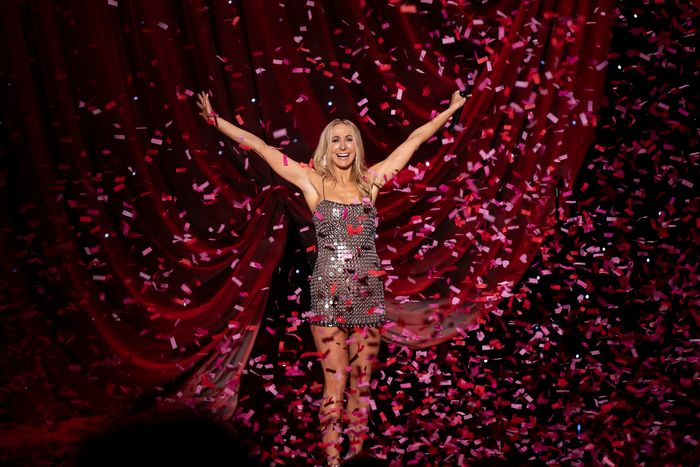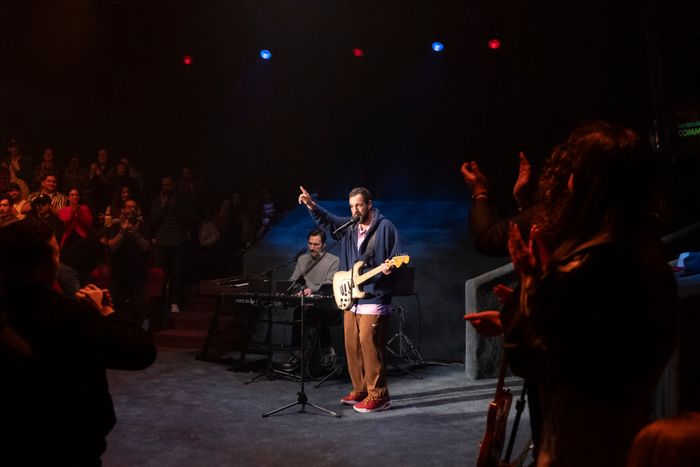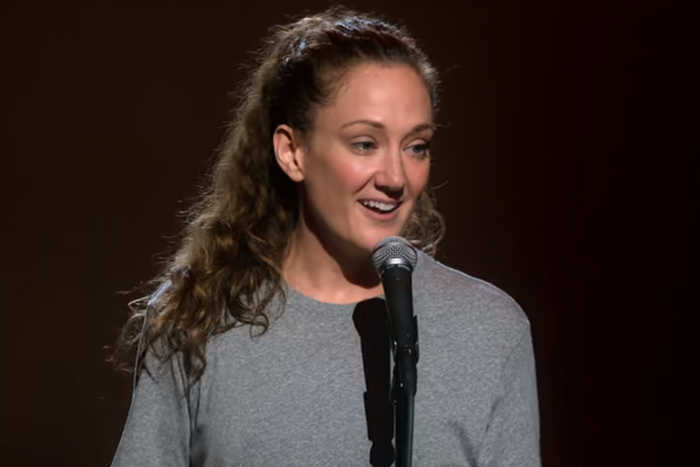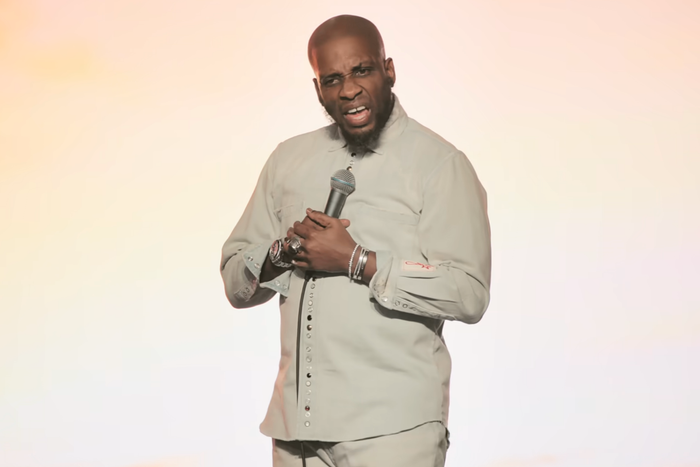
2024 in comedy specials was a year shaped by the work of established comedians, especially those whose specials are explicit or suggestive developments of their familiar artistic identities. As a result, the year’s most compelling specials are best understood as culminations or continuations. Anthony Jeselnik’s Bones and All is a 20th-anniversary achievement. Ramy Youssef’s More Feelings is a knotty sequel to Feelings. Those releases — alongside specials from Ali Wong, Adam Sandler, and Nikki Glaser — are stand-alone hours with their own motives and internal logic, but they’re much more striking when seen in the context of their previous specials and the comedic personas they’ve developed for years.
Sandler’s special is a fascinating, artfully subtle attempt to wrestle with his own fame. After years of work unpacking one of humanity’s primary drives (sex), Glaser finally turns toward the other looming presence (death). Wong’s special represents an evolution in the self she’s been presenting for her audience and a sharp, deliberate turn away from the prison of relatability. The most explicit example is Ali Siddiq’s Domino Effect Part 3, which works best when seen as one part of Siddiq’s long-running, multipart stand-up memoir project. But there are also a few excellent specials from relative newcomers, including Langston Kerman and Courtney Pauroso, and singular works from established performers such as the ever-remarkable Kyle Kinane. In all, it’s an impressive group of specials, made even better by how many different styles of stand-up excelled: There are one-person-show types, casual club presentations, highly choreographed art-house projects, and also an hour of sex-robot clowning.
10.
Ali Wong, Single Lady
Netflix, 59 minutes
Wong’s work has always been distinguished by her fearlessness and her drive to talk about mundane realities that other people hesitate to disclose. Her jokes are not a self-deprecating list of flaws; they do not read as vulnerability. But neither are they full of explicit, cartoonish arrogance. She presents blanket statements of fact about her life, regardless of whether those facts are unusually forthright descriptions of sex and desire, pregnancy, her financial motivations, or her changing relationship to being an increasingly famous person. That directness is what gives Single Lady such oomph. Her own pleasure is palpable throughout — in her obvious relish in telling stories about her life post-divorce, but also in the way she excises every one of the most appealing or appalling details and presents it matter-of-factly, without coyness or false modesty. Every joke has a This is the good part of this story mood. Every new anecdote is told with straightforward, unshakable confidence.
9.
Langston Kerman, Bad Poetry
Netflix, 50 minutes
Kerman’s geniality is really a Trojan horse. His stage presence exudes friendly approachability, and the jokes are friendly sometimes, especially in the setups. But more often, they’re full of sharp edges that leap out toward the ends. A joke about his former life as a school teacher starts comfortably enough as a fun impression of a student who insulted him during class, but by the end, the things Kerman imagines saying and doing to that student have so far surpassed the initial insult she threw at him that it’s no wonder he’s better suited to stand-up than to teaching. Bad Poetry is an accomplished hour, made even more distinctive through Kerman’s willingness to sometimes just let things be weird. Three voice messages he plays throughout the hour, for example, are funny in a way that’s far more bizarre than laugh-out-loud. Their presence underlines what makes Kerman such a compelling performer: So cheerful and warm on the surface, but underneath, things are much stranger and pointier than they first appear.
➼ Read our interview with Kerman and Bad Poetry director and producer John Mulaney.
8.
Ramy Youssef, More Feelings
Max, 55 minutes
One of Youssef’s superpowers as a comedian is his comfort with ambiguity. He has an unusual ability to talk through and reconsider large, messy ideas about religion, morality, and what it means to be a good person, and it’s always rooted in the sense of who he is and what questions he cares about. But he does it in a way that avoids the standard stand-up approach of being stupidly definitive for the sake of humor. More Feelings, like his previous special, allows Youssef to once again thrive in all the uncertain gray areas, especially in his material on politics and family. The show’s set piece is a story that lives in all the awkward, mixed-emotional space of a childhood memory you’re not proud of; it’s a story about schoolwork he didn’t do, his guilt and glee at getting away with something, and it’s full of uncomfortable mixtures of shame and pride. Plus, for all the Chris Storer–heads created by The Bear, More Feelings is full of Storer’s signature direction style, with long profile-shot close-ups and a warts-and-all sense of casual intimacy.
➼ Read our interview with Youssef about his first Israel-Palestine joke he wrote after October 7.
7.
Kyle Kinane, Dirt Nap
YouTube, 72 minutes
The centerpiece of Dirt Nap is Kinane’s very long joke about his cat, named Dirt Nap. Calling it a joke about a cat is already a misnomer, though: It’s a very long joke about the pandemic and what it was like to live during this bizarre and alienating time, and it allows Kinane to do the kind of comedy he does better than anyone else. The joke’s half-hour run time feels winding and anecdotal, until you realize Kinane’s been weaving this whole nest of an idea around you the whole time. It gives him opportunities to create characters and do small act-outs, which always feel like surprising little presents from a comedian with such an otherwise writerly brain. It’s a masterful closer, but everything that precedes it is just as weird and delightful, especially his lengthy detour through action-movie criticism. His joke about movies in which the president gets kidnapped is a little sidebar and also some of the most deft political commentary this year.
➼ Read our piece on why Kinane’s long joke is good.
6.
Courtney Pauroso, Vanessa 5000
Dropout, 64 minutes
Pauroso’s Vanessa 5000 is part of the current indie-clowning wave, and Pauroso’s clown is a mindless, stilted sex robot named Vanessa. In black leather and a cheap blonde wig, Pauroso gets the audience to engage with Vanessa on the terms defined by her programming. They slap her ass. She pretends to be absorbed by their interests. In the first third of the show, it’s all fun and chuckles, with jokes about Vanessa’s limitations and the obvious commentary on sex and masculinity implied by her programming. But as Vanessa continues the show, some of her more intense subroutines start to take over, and Pauroso’s talent for physical performance and emotional range turns Vanessa 5000 into something angrier, sadder, and more unhinged. It’s a smart and upsetting expression of what clowning can create as a form, and the way careful character work allows Pauroso to build an entire world that she can then tear down and rebuild over the course of an hour.
➼ Read our interview with Pauroso.
5.
Anthony Jeselnik, Bones and All
Netflix, 51 minutes
Jeselnik’s Bones and All is an anniversary achievement, and toward the end, he takes what is, for him, an unusual turn. The final 20 minutes become almost sentimental, a retelling of some of the milestone moments in his 20-year career. There’s a story about how he met Norm Macdonald and his time as a judge on Last Comic Standing. He retells the first joke that helped him define his comedic identity, which feels like a rare comedy version of a celebrated band doing a greatest-hits album. But the first ten minutes of Bones and All are where the hour distinguishes itself. Jeselnik begins with a run of jokes about trans people and pregnant women that deftly places him within current cultural discourse, while also allowing him to leap over a whole tranche of comedians still struggling to find new ways to be shocking about a topic that’s become depressingly familiar. Nimble, precise, and densely written, the opening section is yet more proof that no one has mastered this comedic lane better than Jeselnik.
➼ Read our profile of Jeselnik and Bones and All.
4.
Nikki Glaser, Someday You’ll Die
Max, 60 minutes
Glaser has had a good year, which most people know from her work on the Netflix roast of Tom Brady. But what Glaser should be most known for right now is Someday You’ll Die, which is the most virtuosic and impeccably made special so far this year. Glaser’s known for sex jokes in the vein of the incredible run she does in her 2019 special Bangin’, but Someday You’ll Die takes that same cheekily dirty mind-set and re-centers it in her awareness of getting older. She has material about deciding not to have children, about death and physician-assisted suicide, and her closer is an astonishing piece about the sex games she plays with her partner that manages to be both sweet and filthy. Someday You’ll Die should also get attention for its lovely set and lighting design, which uses a glam draped curtain and shifting light tones to capture Glaser’s high-class debauched sensibility and her movement from one idea to another.
➼ Read our piece on Glaser’s joke style in the special.
3.
Adam Sandler, Love You
Netflix, 74 minutes
The difference between a gimmick and a meaningful artistic choice comes down to how well the concept illuminates some idea or argument about the broader work. Gimmicks stay superficial, grabbing attention but not translating to something deeper. “Make Adam Sandler’s new special feel like a Safdie movie” could just have been a gimmick, especially if the show had been restricted to the tense, nerve-racking opening sequence. But when Love You, directed by Josh Safdie, stretches the conceit into the body of the special, it pushes its premise of a messy show teetering on collapse past gimmickry and uses it to articulate ideas about fame, joy, performative pressure, and the value of comedy. It’s especially useful as a run-up to Sandler’s last song, an ode to his comedy heroes, but the whole special is better for it. Sandler is still the famous, rich comedian here, but he’s beleaguered, frustrated, and hopeful, desperately trying to make sure everyone has a good time. And it works: The special is distinctive and artful but also just an entertaining way to spend an hour.
➼ Read our review of Love You.
2.
Jacqueline Novak, Get on Your Knees
Netflix, 94 minutes
In the list of one-person-show features exemplified by other specials on the list this year, Novak’s fully embodies some (an autobiographical focus, one big idea that’s explored over the course of the hour) and notably departs from many of the others. She does follow a structure that curves toward gravity before rebounding into positive feelings, but her idea — which is blowjobs, but also the joy of language and creative expression — is so full of ebullience and energy that the show itself seems to burst out of its own seams. The special, directed by Natasha Lyonne, is an almost dizzying visual representation of Novak’s animated physical presence, with a camera that tracks her across the stage almost like it’s following a high-stakes tennis match. It’s overwhelming to watch, which is exactly the point.
➼ Read our 2019 interview with Novak about Get on Your Knees and Novak’s first-person essay about returning to the show after its pandemic-driven hiatus.
1.
Ali Siddiq, Domino Effect Part 3: First Day of School
YouTube, 77 minutes
There’s nothing else in comedy like Siddiq’s multipart Domino Effect, and it’s hard to imagine what other comedian could ever come close to pulling off the epic creation he’s been building for the past few years. Each YouTube installment is its own long special (often over an hour), but they all connect as pieces of Siddiq’s autobiography, beginning from childhood and continuing through the years he spent incarcerated for selling drugs. No part of Domino Effect is bad, but Part 3 is a particularly remarkable standout. It’s centered on the period of Siddiq’s life when he’s been imprisoned but not yet found guilty or sentenced, and that moment is especially suited to allowing Siddiq to play to his strengths as a comedian. He creates and embodies all of these characters in the world he’s describing, and he’s incredibly adept at reviving and narrativizing his younger self. It’s both enormously funny and some of the most moving depictions of a particularly American life experience available in any genre, in a way that makes him feel like a modern Mark Twain. Someone please call the Pulitzers.
➼ Read our interview with Siddiq about Domino Effect.



